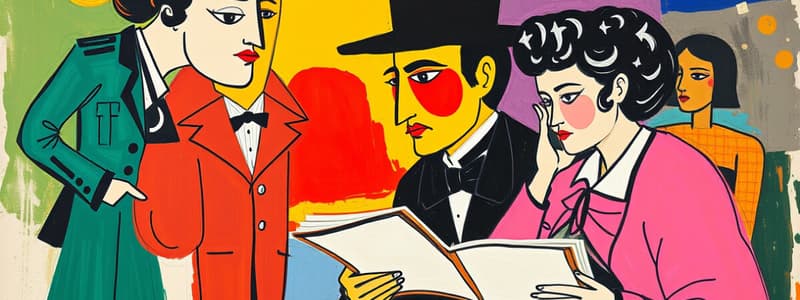Podcast
Questions and Answers
What does Algernon think about marriage?
What does Algernon think about marriage?
Marriage is a social obligation and a matter of business.
Who is the primary audience of 'The Importance of Being Earnest'?
Who is the primary audience of 'The Importance of Being Earnest'?
- International audience
- Middle class
- Working class
- Victorian society audience (upper class) (correct)
How does Jack express deception in 'The Importance of Being Earnest'?
How does Jack express deception in 'The Importance of Being Earnest'?
Jack pretends he has an imaginary brother that he plans to 'kill off' to lead a double life.
In 'The Importance of Being Earnest', life can be lived as art.
In 'The Importance of Being Earnest', life can be lived as art.
What does marriage symbolize in the context of 'The Importance of Being Earnest'?
What does marriage symbolize in the context of 'The Importance of Being Earnest'?
Algernon calls marriage a social obligation.
Algernon calls marriage a social obligation.
What moral responsibility does Algernon believe the servant class has?
What moral responsibility does Algernon believe the servant class has?
What does 'double talk' refer to?
What does 'double talk' refer to?
What character traits define Lady Bracknell?
What character traits define Lady Bracknell?
How do Jack and Algernon differ in their approaches to honesty?
How do Jack and Algernon differ in their approaches to honesty?
In the play, earnestness implies seriousness and sincerity.
In the play, earnestness implies seriousness and sincerity.
Flashcards are hidden until you start studying
Study Notes
Marriage and Social Obligations
- Algernon views marriage primarily as a social obligation, referring to it as "business."
- Jack expresses his intention to propose to Gwendolen but recognizes a societal expectation behind that action.
- Marriage is depicted as a means to secure social status rather than an expression of love.
Audience and Social Satire
- The play is aimed at an upper-class Victorian audience.
- It satirizes earnestness and the superficial nature of marriage as a tool for social elevation, emphasizing style over substance.
Deception and Self-Expression
- Deception is portrayed as a method of self-expression; Jack and Algernon engage in deceit to navigate societal expectations.
- The term "bunburyist" describes someone leading a double life, allowing for moral flexibility.
Life as Art
- The narrative suggests that life can embody art, with untruths presented as beautiful to enhance the experience of living.
Themes of Status and Marriage
- The tension between love and social duty is central, with character relationships formed through societal expectations.
- Importance of unexpected engagements reflects the value placed on social standing rather than emotional connection.
Constraints of Morality
- Algernon critiques the moral responsibilities placed on upper classes by the servant class.
- Jack's discomfort with reading a cigarette case reflects Victorian ideals on propriety and moral conduct.
Style Over Substance
- Characters prioritize appearances and social standing in their actions, often disregarding genuine intentions.
Double Talk
- The use of ambiguous language serves to disguise truth, reflecting the characters' need to maintain façades.
Passive-Aggressive Communication
- Characters frequently engage in subtle criticism masked as politeness, highlighting social tensions and hypocrisy.
Bunburying Significance
- The concept of bunburying allows characters to escape societal constraints, underscoring the theme of deception for personal freedom.
Lady Bracknell's Character
- She is depicted as ruthless and domineering, often making absurdly definitive statements about social norms and relationships.
Hypocrisy vs. Inventiveness
- Jack's hypocrisy contrasts with Algernon's and Cecily's creative storytelling, which does not mislead others but instead creates positive narratives.
Critique of Earnestness
- The play critiques the Victorian virtue of earnestness, illustrating how seriousness is frequently trivialized.
- Characters equate style with sincerity, suggesting that societal pressures compel them to craft alter egos to evade moral constraints.
Studying That Suits You
Use AI to generate personalized quizzes and flashcards to suit your learning preferences.




